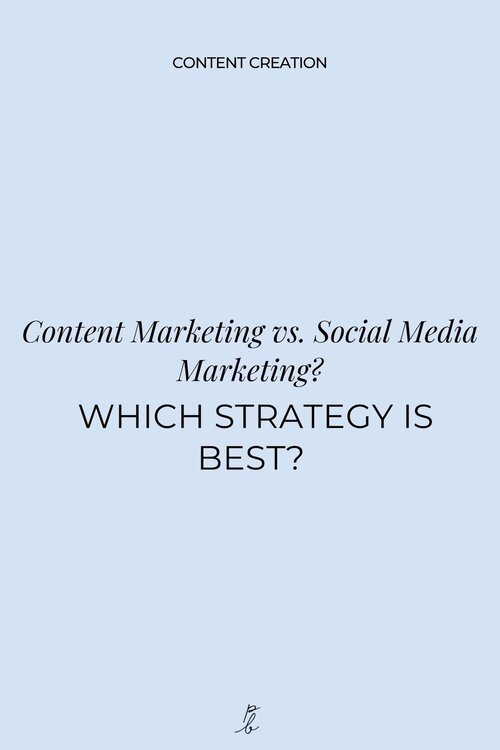Content marketing vs. social media marketing? Which strategy is best?
Wondering how best to get the word out about your business? 🤔
You’ve heard me say this before, but when it comes to marketing and getting your business in front of new eyeballs, consistency really is key!
Half-heartedly dabbling in different strategies may win you a handful of new clients and customers here and there, but it won’t deliver those long-term results you’re after!
Whatever method you choose, it has to be something you are committed to doing on the regular (and with some actual gumption!)
In order to go “all in” on your new marketing plan, you really need to first narrow down which path is right for you!
So in order to save you from having to personally test every marketing strategy under the sun ☀️ , let me share what my experience has been with today’s two featured strategies in hopes of bringing you a little more clarity for your big decision!
What’s the difference between content marketing and social media marketing?
Before we talk pros and cons, we should probably nail down what exactly I mean by “Content Marketing” vs. “Social Media Marketing.”
Here’s the super nutshell definition…
Both strategies revolve around you creating some sort of content to:
A) Increase brand visibility
B) Increase traffic to your site
C) Build trust by helping your audience
D) Point to your paid offerings in non-salesy way
Really the only difference is the length of the content, and where that content lives.
Content marketing (blogging, YouTubing, podcasting) tends to be long-form, and lives on your site…or in the case of video and podcast, the show notes live on your site.
Social media marketing is where you create short form content (images, graphics, simple captions or announcements, short videos and live stories) to be shared on platforms that you do not own or control, and therefore lives off your site.
So which one is right for you? Let’s compare!
Content Marketing vs. Social Media Marketing
Online business marketing strategy #1
Content Marketing
Long-form content is Keyword rich & SEO friendly
I think the biggest difference to note between the two types of content strategies is honestly just how your audience is able to discover you in the first place!
When someone hops on Google to research “How to change the air filter on a 2011 Toyota Camry” then Google is going to recommend the result they think most likely to answer their question.
How does Google know? Well, they don’t.
But they are going to assume that a 1,500 blog post or 15 minute video is going to cover the topic in much greater detail than a 150 word Instagram caption, which is why you’ll rarely see Google recommending short-form social media content at the top of their search results.
And when they notice that your long-form piece of content just happens to mention the exact words and phrases their users are searching for, they start to consistently send traffic your way.
Keywords also makes the content on your site super-searchable by someone on a learning binge! So if they are new to your business, but want to mine the knowledge gold waiting in your content archives, they just need to type in a few words, and voilà...
All the content you’ve ever created around that sub-topic at their finger tips!
Social media does not make it very easy on your audience to search and find past content, without having to manually scroll through your posts. So they could end up missing some of your best work!
Aren’t hashtags kind of like SEO keywords?
Absolutely! They can be a fabulous tool for getting your business found!
But they tend to be much less literal in their wording, so if someone is new to your industry, they may not be aware of which hashtags are currently trending.
(ie. Photographers using the popular hashtag #dirtybootsandmessyhair are more likely to attract other photogs than actual new client leads who have never heard of that hashtag that seemingly has nothing to do with photography)
This is why long-form content in my experience is naturally going to be much easier to get in front of the most relevant audience for your business!
Speaking of which…
You are reaching people who are actively researching your topic
If someone discovers you after intentionally searching something very specific on Google, they are a whole lot more likely to be invested in your topic than someone who happens upon you passively during their daily lunch break scroll, making them much more likely to be interested in a paid offering on the same topic.
So you really do tend to be attracting people in a more committed stage of their journey.
More complete answers for your audience
Let me start by saying that it is 100% possible to help your audience with short-form content!
Not everything has to “the complete beginners A-Z guide” in order to bring value, and truly impact and inspire your audience!
(In fact, there’s a lot to be said for helping them achieve small wins often!)
But if your topic does require a bit of extra explaining, you may feel limited by what you can create on short-form platforms. (ie. me trying to give a Squarespace tutorial in an Instagram caption!)
So it’s easier to provide thorough answers to people trying to learn about your topic when you have longer formats of content to work within!
And as I mention above, Google loves complete answers.
Content Marketing is Evergreen
When it comes to blogging, YouTubing, or podcasting, your audience can pretty much consume that content whenever it works for them!
It’s not going anywhere!
So the posts you are creating today can continue to serve your business indefinitely.
Some of my highest traffic content is stuff I posted years ago, but still ranks on page 1 of Google (the effects of that one piece of content snowballing over time! ⛄️)
Whereas one downside to Social Media content is that your audience has a greater potential to miss your hard work! Maybe your story expired before they could see, or the algorithm decided not to bother showing your post in their feed at all, or they did show it, but other creators have since posted new content, bumping your post wayyyy down the scroll.
Long-form content (specifically blog posts) can also easily be refreshed to bring it up to date if new trends appear, or in the case of tech-related posts, the software gets an overhaul and the steps are no longer relevant.
You can beef up past posts with new keywords and expand on a topic as you learn more to make the most of the content you already created.
Or if over time, you straight up change your views on something, you have the ability to go back and clarify without having to create a whole new post that contradicts a previous one.
So at least for me, long-form content has always had a much greater lifetime return on the initial time invested.
Your Calls-To-Action tend to be higher value
When your content lives on your own website (v.s. a third party platform) your audience is already one step closer to your “book”, “buy” or “subscribe now” button, so it can be much much easier to get them to take the action you are hoping they will!
Free long-form content is an incredibly effective, non-salesy way to lead straight into your paid offerings!
(See: How to use your free content to market your paid offerings)
With social media, unless you are already established, have 10,000+ followers and have been granted access to the swipe up/linking feature, then you have just one way to get people to where you want them to go…your link in bio!
So you really have to use that precious real estate wisely!
Even if you use a service like LinkTree to create your link in bio, your LinkTree buttons have probably seen some tweaks since that post you made 37 weeks ago. (And ain’t nobody gunna take the time to manually type out: https://paigebrunton.com/squarespace-online-courses) 🤷♀️
Priorities can also start to get a bit muddled when you're trying to split your CTA opportunities between sending traffic over to your website where your paid offer lives, and having followers stay and engage with you right there on your social media profile by liking, commenting, etc.
You directly benefit from the increased traffic because the content lives on your site
This, in itself, is sort of the end-all-be-all reason I preach content creation!
If you’re going to put all that hard work into creating something, you want any traffic that comes your way to benefit YOU (not Mark Z.)
Plus, you’ll have increased engagement time, because once they are on your website, you are no longer competing with other creators in their scroll.
Until they close that browser, the floor is yours!
So obviously blogging is a no brainer in terms of creating content that lives on your own site…but the same can be true for YouTube & Podcasts. The episode itself might be hosted another platform, but all the lasting SEO goodness happens in your keyword-rich show notes!
Suggested reading: 1 big SEO mistake YouTubers & Podcasters are making
Fewer internet trolls and armchair experts telling you you’re doing it wrong
When people wind up on your blog or podcast, they are there with a purpose. They aren’t just some bored keyboard-warrior looking to stir a little 💩.
So you really don’t get as many nasty or unhelpful comments (or straight up spammers) as when you put yourself out there on a more passive social media platform.
The feedback I do get is *usually* well-meaning since they actually took the time out of their day to write me an email explaining their experience, and I welcome those!
So those are just a few of the reasons I reach for content marketing over social media in my own business!
But thankfully, there is no one right way to be marketing your business!
You might find, based on your business and the audience you are hoping to reach that social media marketing is a better fit!
(Like lovely past student Ayesha shares in this post: 👉 How Ayesha used Instagram to hit her first $10K month as a web designer
So now let’s look at some of the benefits of social media marketing has over content marketing!
Online business marketing strategy #2
Social Media Marketing
Less time-consuming to create
Even though I’ve been known to spend wayyyyy too long trying to come up with a single caption for the ‘Gram, for the most part, the content you post on social media takes much less time to create.
In order to stay consistent with our long-form content, I find we have to batch it weeks in advance…but not social media! If needed, you can quickly hop on and share pretty much everything they need to know on a story or live.
Obviously you’re still want going to want to have a social media content strategy so you aren’t just posting all willy-nilly and not seeing results, but generally it’s easier to stay consistent with than something that you need to set aside a solid chunk of time for each week.
On the flip side, it can get old having to show up in person all the time, even if it takes less time overall.
I do love the luxury of blogging because I can do it whenever I feel like it, without having to comb my hair or change out of yesterday’s yoga pants.
I can be batching out month’s worth of content, and scheduling it in advance, then peace-ing out for weeks and nobody knows the difference. ✌️
It can be easier to get started
If you don’t feel like you’re a strong writer, or you don’t currently own a camera or mic to film audio/video, then it can take a bit of prep to get your content to the level you feel it needs to be before you show it to the world.
The expectation in terms of the finished “production value” is a lot less when it’s something you’re casually posting on the ‘Gram which is good news for my perfectionists out there!
More immediate short-term results
If you’re just getting started in your business and need to make money STAT, you may see results more quickly with social media, as all it can take is one person seeing your post, or one well-timed DM to land that first or next client.
Content marketing can feel a bit slow going at first. Like you’re spending a whole lot of time creating content for people who don’t even know you exist yet.
But like I mentioned earlier, pretty soon the traffic you see from consistent content creation starts to snowball, and suddenly ideal client inquiries are popping up daily, instead of you having to go hand search for that new person every time and convince them in your DMs.
Easy to deliver quick wins
When you aren’t having to come up with 1,500+ words, or editing the heck out of a YouTube video, it can be pretty quick and easy to consistently share value with your audience.
I’ve seen some crazy-useful tips and informational graphics posted that could be the exact thing that someone in your audience needs to experience a quick win and stay motivated on their journey!
So you are more likely to share what you are learning with your audience right away when all it takes is a simple graphic or you hopping on stories to share it.
Engagement is more two-sided
While there are endless ways to create connection with your audience, admittedly, you do have to work at it a bit harder to maintain that human touch when you are pumping out long-form content for the “many” as opposed to meeting people 1:1 in your DM’s and comments.
(My fav way to do this btw is to write quarterly behind-the-scenes blog posts, and to include a question inside weekly newsletters encouraging people to respond so they know there is an actual human waiting for them on the other side of the inbox!)
Connection is super important when it comes to building that know-like-trust factor needed to sell online…and my guess is you probably didn’t start your business to feel like a faceless robot who takes money from strangers on the internet 🤷♀️
So whether you’re on there to get your weekly fill of human interaction, or you need new ways to help fence-sitters get off the fence in your business, social media does have it’s perks in the engagement department!
Suggested reading: I finally learned how to make Instagram drive sales
Content is highly shareable
Now, I do include hidden Pinterest graphics in every single blog post I write…
(See: How to hide Pinterest images in a Squarespace blog post)
…but social media definitely makes it a lot easier on your audience to share your content for you!
And I can’t remember the last time a blog post went “viral.” 🤷♀️
BUT, I still think there’s something to long-form content being more “evergreen” like I share earlier in this post.
Even if they don’t have the potential to blow up overnight, the long-term benefits tend to outweigh those 15 minutes of fame.
The exception to this rule is YouTube, of course! It can easily go viral AND have those long term SEO benefits you expect from content marketing!
So which strategy is better?
Honestly? Whichever one you will do CONSISTENTLY is the one that will be most effective in growing your business!
I’m always going to shout out about the benefits of content marketing, because it is what has transformed my own business! I chose a strategy, and stuck with it rain or shine!
But there are legit thousands of business owners out there making social media and other methods we don’t cover in this post work for them!
(I interview 8 of those successful business owners with completely different marketing strategies and success stories in my Square Secrets Business™️ course for web designers!)
So whatever you choose, make sure it feels like YOU because it’s much easier to stay consistent with something that doesn’t feel like a chore!
Want to know more about why I chose content marketing for my business?
I blogged consistently for 1 year, here's what happened to my traffic
How I exploded my business using organic SEO (without spending a cent on ad campaigns)
The most successful online businesses all have this 1 thing in common (valuable content)
Honesty hour: What a year without Instagram did to my business








.jpegContent+marketing+vs.+Social+Media+Marketing%3F+Which+strategy+is+best%3F?format=500w)